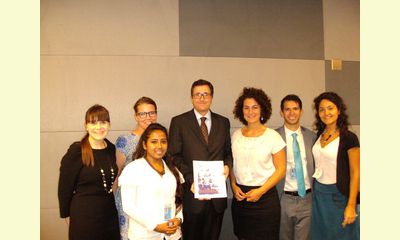|
|
UNOY Youth Advocacy Team at the UN, October 2013
an article by Gracia Romeral Ortiz Quintilla
It has been some time since I wanted to get
experience in advocacy work in issues related to
youth and peacebuilding when I saw that the United
Network of Young Peacebuilders (UNOY) was
preparing an advocacy project in these topics.
Concretely, UNOY was seeking for members of their
network to apply for the next mission of their
Youth Advocacy Team (YAT) at the United Nations
(UN) Headquarters (HQ) in New York (NY). I
immediately applied, I got an interview and was
selected on behalf of my organization, Fundació
Catalunya Voluntŕria, to become a YAT member. In
total 5 members were selected: Ariadne from the
Netherlands, Iram from India, Jude from Cameroon,
Paula from Colombia and myself from Spain. This is
how I started my journey in advocacy for youth and
peacebuilding where I hope to stay engaged for a
long while.

The YAT team with the Deputy Permanent Representative of Argentinia, Mr. Mateo Estreme (center). Team members from left to right: Laura McManus, Matilda Flemming, Iram Parveen, Ariadne Asimakopoulos, David Langle and Paula Ramirez. Photo by team member Gracia Romeral Ortiz Quintilla.
click on photo to enlarge
The main goal of the UNOY YAT is to advocate to
recognize and to strengthen the role of youth in
peacebuilding processes. What does it mean? Two
important clarifications: (i) from UNOY we
understand peacebuilding from an holistic approach
which includes the promotion of the culture of
peace, education for peace, conflict
transformation, non-violence, intercultural
dialogue, human rights and mindfulness among
others and (ii) not only in a context of (post-)
armed conflict but also in societies that are
confronted to cultural and structural violence as
can be huge rates of unemployment among youth or
gender based violence.
Currently, the UNOY advocacy strategy is mainly
happening at the UN level and this goal is
supported by two main advocacy pillars: (1) to
lobby for a UN Security Council resolution on
youth, peace and security and (2) to lobby the UN
Members States to ensure that peacebuilding and
young peacebuilders are included in the post-2015
development agenda. But in the past, UNOY YAT has
also worked on raising awareness on the role of
youth in the framework of the 2001-2010 Decade for
the Culture of Peace and Nonviolence for the
Children of the World.
In that sense, while the YAT that traveled to NY
in July mainly focused on the first pillar, with
the YAT I am part of, we prepared a mission to the
UNHQ under the second pillar: to lobby for a
recognition of “the unique needs, roles and
perspectives of young peacebuilders in framing of
a new development agenda, concretely in the post-
2015 agenda” (UNOY YAT –presentation document).
During the two months prior to our trip to New
York, we conducted interviews with UNOY members to
grasp their ideas, experiences, recommendations
but also challenges and concerns as young
peacebuilders regarding the post-2015 agenda.
Based on these interviews, on an online survey and
on an extensive research, UNOY YAT developed the
report: “A Space for Peace: Inclusion of Youth and
Peacebuilding in the Post-2015 Development Agenda”
that was launched in New York in cooperation with
the Permanent Mission of Argentina during our
advocacy week.
After a thorough and intense preparation, beginning
of October, the UNOY YAT traveled from the 4 corners
of the world to meet in NY and implement our
advocacy strategy.
(This article is continued in the discussionboard)
|








|
DISCUSSION
There is no question yet associated with this article.
* * * * *
Latest reader comment:
(The following is continued from the main article listed above.)
We only had 5 days to accomplish our mission: to convince UN Members States and UN bodies to include youth and peacebuilding in their agenda, or at least, to encourage them to recognize the positive role that youth is playing in peacebuilding.
What did we do to fulfil this?
To a certain extend, I would say we went crazy trying to attend as many events as possible to increase our visibility, to schedule as many meetings as possible with Members States and UN staff to make them aware of our advocacy plan and have them on board in our mission, but also to launch two reports: the one on youth and peace in the post-2015 and another on the UN agreed language on youth and peacebuilding.
But we did achieve great and concrete results:
We attended UN side events, trainings; we launched the two reports at the UN premises; we met with more than 40 representatives from Permanent Missions, UN staff, Youth Delegates and Civil Society Organizations, but most important we managed to have on the draft version of the UN General Assembly Youth Resolution a paragraph on youth and peacebuilding: the seeds to see, with time, an entire resolution dedicated to youth and peacebuilding at the General Assembly and hopefully at the Security Council as well.
An important lasting result worth mentioning too is the friendship we built from the UNOY YAT: Paula, Laura, Matilda, Iram, Jude, David, Ariadne, from whom I learned as great and committed young peacebuilders and persons they are.
We are aware that this is only the beginning of a work that will be long and hard and that in the path to see the recognition of youth and peacebuilding we may encounter many obstacles, but we will not stop here because we believe in youth and in peace and because as Nelson Mandela would say “it always seems impossible until it is done”.

|
|









